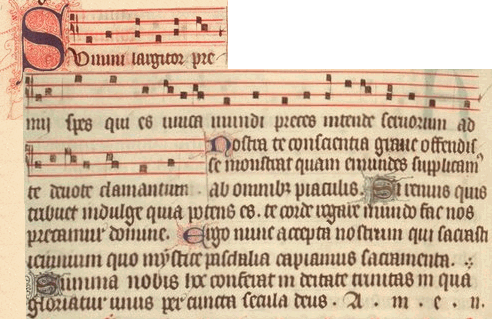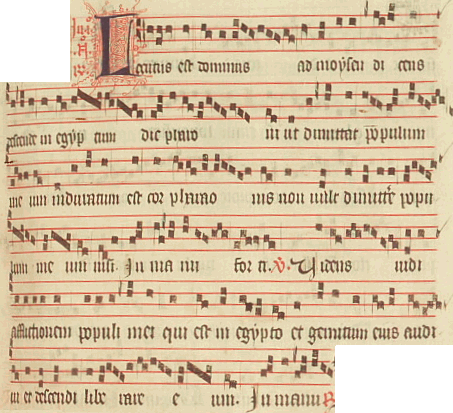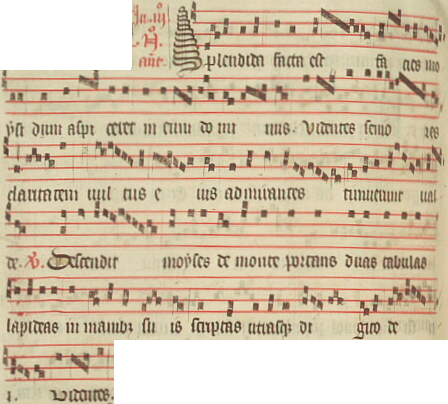READINGS: LENT SUNDAY II

Invitatory Psalm & BACK

PSALMS and BACK
καὶ ἰδοὺ φωνὴ ἐκ τῆς νεφέλης λέγουσα, — οὗτός ἐστιν ὁ υἱός μου ὁ ἀγαπητός: ἀκούετε αὐτοῦ.
Even Years: Exodus 13:17—14:9 וַיְהִי בְּשַׁלַּח פַּרְעֹה אֶת־הָעָם וְלֹא־נָחָם אֱלֹהִים דֶּרֶךְ אֶרֶץ פְּלִשְׁתִּים כִּי קָרוֹב הוּא כִּי אָמַר אֱלֹהִים פֶּן־יִנָּחֵם הָעָם בִּרְאֹתָם מִלְחָמָה וְשָׁבוּ מִצְרָיְמָה׃ וַיַּסֵּב אֱלֹהִים אֶת־הָעָם דֶּרֶךְ הַמִּדְבָּר יַם־סוּף וַחֲמֻשִׁים עָלוּ בְנֵי־יִשְׂרָאֵל מֵאֶרֶץ מִצְרָיִם׃ וַיִּקַּח מֹשֶׁה אֶת־עַצְמוֹת יוֹסֵף עִמּוֹ כִּי הַשְׁבֵּעַ הִשְׁבִּיעַ אֶת־בְּנֵי יִשְׂרָאֵל לֵאמֹר פָּקֹד יִפְקֹד אֱלֹהִים אֶתְכֶם וְהַעֲלִיתֶם אֶת־עַצְמֹתַי מִזֶּה אִתְּכֶם׃ וַיִּסְעוּ מִסֻּכֹּת וַיַּחֲנוּ בְאֵתָם בִּקְצֵה הַמִּדְבָּר׃ וַיהוָה הֹלֵךְ לִפְנֵיהֶם יוֹמָם בְּעַמּוּד עָנָן לַנְחֹתָם הַדֶּרֶךְ וְלַיְלָה בְּעַמּוּד אֵשׁ לְהָאִיר לָהֶם לָלֶכֶת יוֹמָם וָלָיְלָה׃ לֹא־יָמִישׁ עַמּוּד הֶעָנָן יוֹמָם וְעַמּוּד הָאֵשׁ לָיְלָה לִפְנֵי הָעָם׃ וַיְדַבֵּר יְהֹוָה אֶל־מֹשֶׁה לֵּאמֹר׃ דַּבֵּר אֶל־בְּנֵי יִשְׂרָאֵל וְיָשֻׁבוּ וְיַחֲנוּ לִפְנֵי פִּי הַחִירֹת בֵּין מִגְדֹּל וּבֵין הַיָּם לִפְנֵי בַּעַל צְפֹן נִכְחוֹ תַחֲנוּ עַל־הַיָּם׃ וְאָמַר פַּרְעֹה לִבְנֵי יִשְׂרָאֵל נְבֻכִים הֵם בָּאָרֶץ סָגַר עֲלֵיהֶם הַמִּדְבָּר׃ וְחִזַּקְתִּי אֶת־לֵב־פַּרְעֹה וְרָדַף אַחֲרֵיהֶם וְאִכָּבְדָה בְּפַרְעֹה וּבְכָל־חֵילוֹ וְיָדְעוּ מִצְרַיִם כִּי־אֲנִי יְהוָה וַיַּעֲשׂוּ־כֵן׃ וַיֻּגַּד לְמֶלֶךְ מִצְרַיִם כִּי בָרַח הָעָם וַיֵּהָפֵךְ לְבַב פַּרְעֹה וַעֲבָדָיו אֶל־הָעָם וַיֹּאמְרוּ מַה־זֹּאת עָשִׂינוּ כִּי־שִׁלַּחְנוּ אֶת־יִשְׂרָאֵל מֵעָבְדֵנוּ׃ וַיֶּאְסֹר אֶת־רִכְבּוֹ וְאֶת־עַמּוֹ לָקַח עִמּוֹ׃ וַיִּקַּח שֵׁשׁ־מֵאוֹת רֶכֶב בָּחוּר וְכֹל רֶכֶב מִצְרָיִם וְשָׁלִשִׁם עַל־כֻּלּוֹ׃ וַיְחַזֵּק יְהֹוָה אֶת־לֵב פַּרְעֹה מֶלֶךְ מִצְרַיִם וַיִּרְדֹּף אַחֲרֵי בְּנֵי יִשְׂרָאֵל וּבְנֵי יִשְׂרָאֵל יֹצְאִים בְּיָד רָמָה׃ וַיִּרְדְּפוּ מִצְרַיִם אַחֲרֵיהֶם וַיַּשִּׂיגוּ אוֹתָם חֹנִים עַל־הַיָּם כָּל־סוּס רֶכֶב פַּרְעֹה וּפָרָשָׁיו וְחֵילוֹ עַל־פִּי הַחִירֹת לִפְנֵי בַּעַל צְפֹן׃ | 17 When Pharaoh had let the people go, God did not let them take the road to the Philistines' territory, although that was the shortest, 'in case', God thought, 'the prospect of fighting makes the people change their minds and turn back to Egypt.' 18 Instead, God led the people a roundabout way through the desert of the Sea of Reeds. The Israelites left Egypt fully armed. 19 Moses took with him the bones of Joseph, since Joseph had put the Israelites on solemn oath with the words, 'It is sure that God will visit you,' he had said, 'and when that day comes you must take my bones away from here with you.' 20 They set out from Succoth and encamped at Etham, on the edge of the desert. 21 Yahweh preceded them, by day in a pillar of cloud to show them the way, and by night in a pillar of fire to give them light, so that they could march by day and by night. 22 The pillar of cloud never left its place ahead of the people during the day, nor the pillar of fire during the night. 14:1 Yahweh spoke to Moses and said, 2 'Tell the Israelites to turn back and pitch camp in front of Pi-Hahiroth, between Migdol and the sea, facing Baal-Zephon. You must pitch your camp opposite this place, beside the sea, 3 and then Pharaoh will think, "The Israelites are wandering to and fro in the countryside; the desert has closed in on them." 4 I shall then make Pharaoh stubborn and he will set out in pursuit of them; and I shall win glory for myself at the expense of Pharaoh and his whole army, and then the Egyptians will know that I am Yahweh.' And the Israelites did this. 5 When Pharaoh king of Egypt was told that the people had fled, he and his officials changed their attitude towards the people. 'What have we done,' they said, 'allowing Israel to leave our service?' 6 So Pharaoh had his chariot harnessed and set out with his troops, 7 taking six hundred of the best chariots and all the other chariots in Egypt, with officers in each. 8 Yahweh made Pharaoh king of Egypt stubborn, and he gave chase to the Israelites. The Israelites marched confidently away, 9 but the Egyptians, all Pharaoh's horses, his chariots, his horsemen and his army, gave chase and caught up with them where they lay encamped beside the sea near Pi-Hahiroth, facing Baal-Zephon. |
Odd Years: Deuteronomy 18:1-22 1 לֹא־יִהְיֶה
לַכֹּהֲנִים
הַלְוִיִּם
כָּל־שֵׁבֶט
לֵוִי חֵלֶק
וְנַחֲלָה
עִם־יִשְׂרָאֵל
אִשֵּׁי
יְהוָה
וְנַחֲלָתוֹ
יֹאכֵלוּן׃
| 1 The levitical priests, the whole tribe of Levi will be without share or heritage of their own in Israel; they will live on the foods offered to Yahweh and on his heritage. 2 Levi will have no heritage of his own among his brothers; Yahweh will be his heritage, as he has promised him. 3 This is what is due to the priests from the people, from those who offer an ox or a sheep in sacrifice: the priest must be given the shoulder, the cheeks and the stomach. 4 You must give him the first-fruits of your wheat, of your new wine and of your oil, as well as the first-fruits of your sheep-shearing. 5 For Yahweh your God has chosen him from all your tribes to stand before Yahweh your God, to do the duties of the sacred ministry, and to bless in Yahweh's name—him and his sons for all time. 6 If a Levite living in one of your towns anywhere in Israel decides to move to the place chosen by Yahweh, 7 he shall minister there in the name of Yahweh his God like all his fellow Levites who stand ministering there in the presence of Yahweh, 8 eating equal shares with them—what he has from the sale of his patrimony notwithstanding. 9 'When you have entered the country given you by Yahweh your God, you must not learn to imitate the detestable practices of the nations there already. 10 There must never be anyone among you who makes his son or daughter pass through the fire of sacrifice, who practises divination, who is soothsayer, augur or sorcerer, 11 weaver of spells, consulter of ghosts or mediums, or necromancer. 12 For anyone who does these things is detestable to Yahweh your God; it is because of these detestable practices that Yahweh your God is driving out these nations before you. 13 You must be faultless in your relationship with Yahweh your God. 14 For these nations whom you are going to dispossess have listened to soothsayers and mediums, but Yahweh your God does not permit you to do this. From among yourselves, from among your own brothers, 15 Yahweh your God will raise up a prophet like me; you will listen to him. 16 This is exactly what you asked Yahweh your God to do—at Horeb, on the day of the Assembly, when you said, "Never let me hear the voice of Yahweh my God or see this great fire again, or I shall die." 17 Then Yahweh said to me, 18 "What they have said is well said. From their own brothers I shall raise up a prophet like yourself; 19 I shall put my words into his mouth and he will tell them everything I command him. Anyone who refuses to listen to my words, spoken by him in my name, will have to render an account to me. 20 But the prophet who presumes to say something in my name which I have not commanded him to say, or who speaks in the name of other gods, that prophet must die." 21 You may be privately wondering, "How are we to tell that a prophecy does not come from Yahweh?" 22 When a prophet speaks in the name of Yahweh and the thing does not happen and the word is not fulfilled, then it has not been said by Yahweh. The prophet has spoken presumptuously. You have nothing to fear from him. |
Even Years: Origen, Homily 5 on Exodus, 3-4 (PG 12, 328)
Odd Years: Cyril of Alexandria, Commentary on John, Liber 3, cap 3 (PG 73, 427-434)
|
GOSPELS FOR THE THREE CYCLES
*A* , *B* , *C*
| Prayer |

